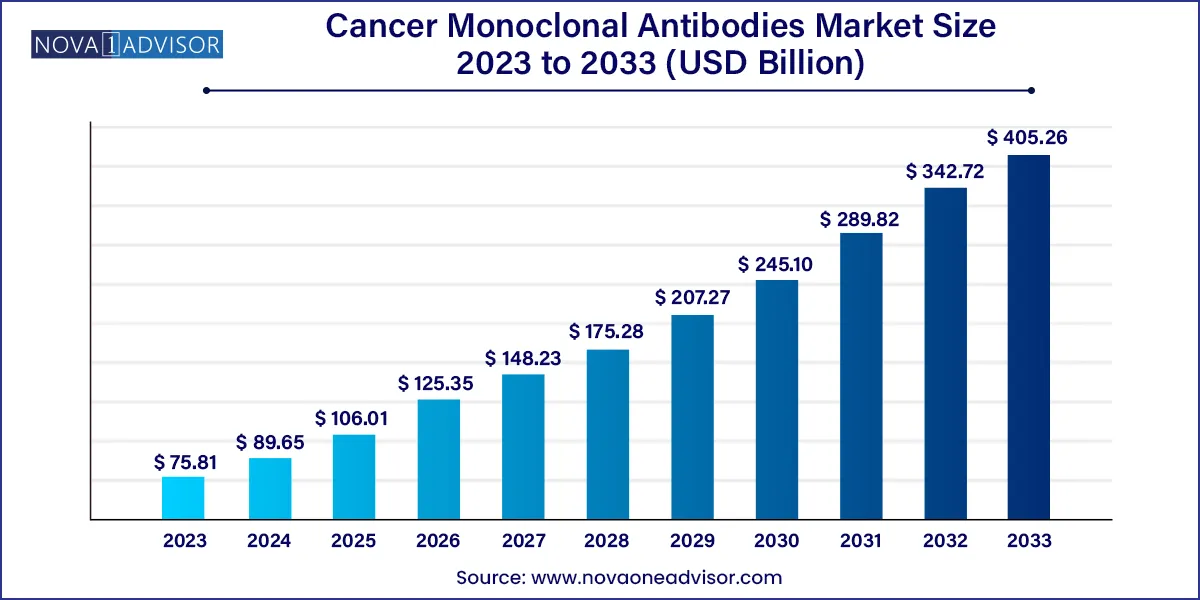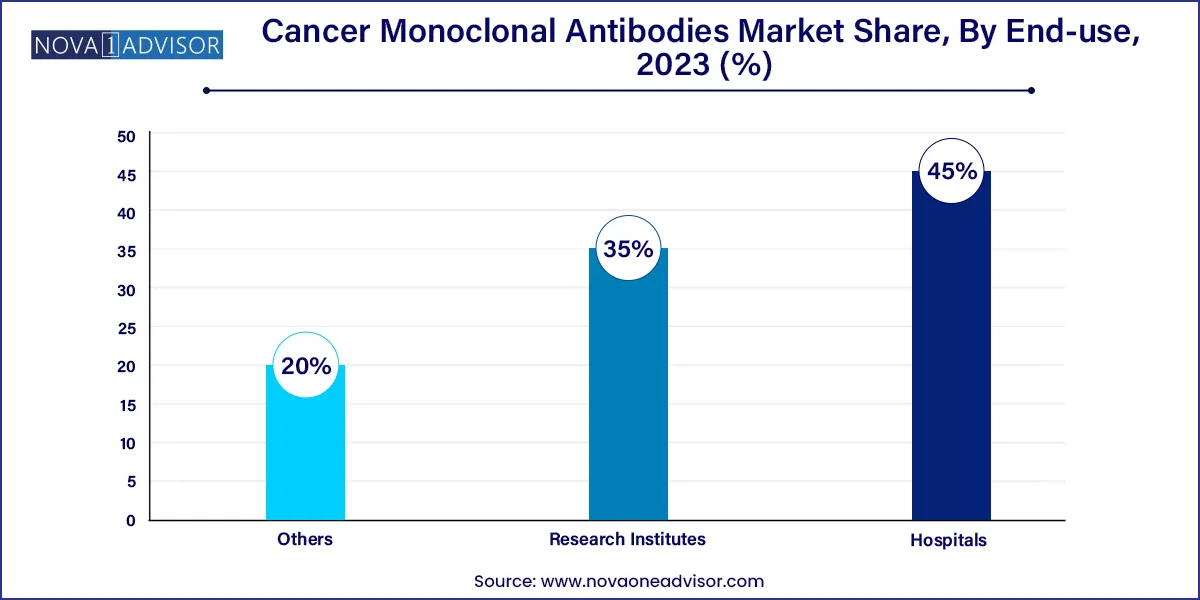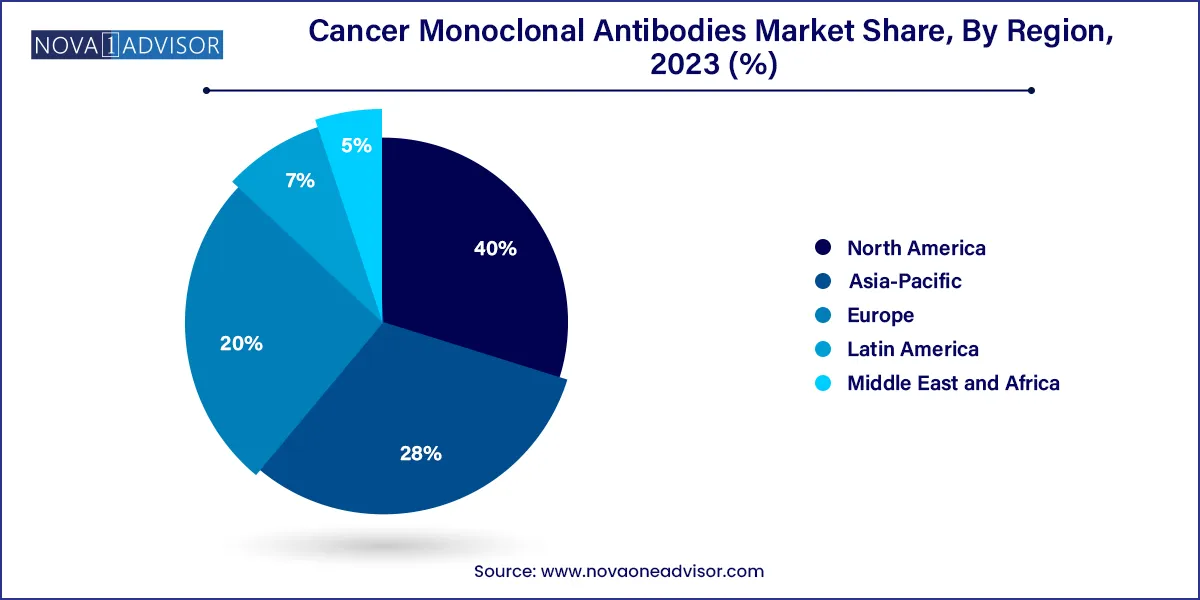
Cancer Monoclonal Antibodies Market Size to Hit USD 405.26 Bn by 2033
The global cancer monoclonal antibodies market size was estimated at USD 75.81 billion in 2023 and is projected to hit around USD 405.26 billion by 2033, growing at a CAGR of 18.25% during the forecast period from 2024 to 2033.

Get Sample Copy of Report@ https://www.novaoneadvisor.com/report/sample/6846
The growth of the cancer monoclonal antibodies market is propelled by the rise in the number of clinical trials related to cancer treatment globally.
The cancer monoclonal antibodies market is one of the booming industries in the healthcare sector. This industry deals with the production of targeted drug therapy for the treatment of cancer and related diseases such as tumors. Monoclonal antibodies (MAB) are also known as anti-angiogenic drugs that are produced in laboratories to act as substitute antibodies to fight against cancer cells. These drugs start working by finding the specific proteins within the cancerous cells and later destroy these proteins to stop cell growth. Monoclonal antibodies are infused into the human body through veins (intravenously) and are sometimes used in combination with chemotherapy or hormone therapy.
- In September 2023, Panacea Venture joined hands with the University of Texas MD Anderson Cancer Center to launch Manaolana Oncology Inc. This new company has been launched with the aim of researching and developing advanced antibody-based therapies for treating various cancer patients.
Cancer Monoclonal Antibodies Market Key Takeaways:
- North America dominated the cancer monoclonal antibodies market with a share of 40.0% in 2023.
- The humanized segment held the highest market share of 40.58% in 2023.
- The blood cancer segment held the highest market share of 23.94% in 2023.
- The hospitals segment held the highest market share of 45.0% in 2023.
Immediate Delivery Available, Get Full Access@ https://www.novaoneadvisor.com/report/checkout/6846
Cancer Monoclonal Antibodies Market Dynamics
Driver
Growing cases of breast cancer and prostate cancer
There is a growing prevalence of cancer across the world. The main types of cancer are breast cancer and prostate cancer, which are most prevalent among people in recent times. According to the American Society of Clinical Oncology (ASCO), about 2,261,419 new breast cancer cases in women in 2020. It also estimated that around 297,790 new cases of invasive breast cancer and 55,720 non-invasive cancer cases among women in 2023 in the U.S.A. Moreover, according to Prostate Cancer UK, prostate cancer is the most prevalent cancer among men, and around 52,000 men suffer from prostate cancer every year in the UK. Thus, these cancers require early diagnosis for early detection and getting cured, which in turn increases the demand for cancer monoclonal antibody therapies, thereby driving the market growth. Also, monoclonal antibody manufacturers such as Johnson and Johnson, Merck, Amgen, and others are actively engaged in research and development activities for cancer treatment and adopting strategies such as approvals, launches, partnerships, and others to maintain their dominance in the industry.
Restraint
High treatment cost and side effects associated with MAB
The treatment of cancer by using monoclonal antibody therapies requires a good amount of money regularly. Thus, middle-class people living in underdeveloped and rural areas find it difficult to treat cancer using MABs. This, in turn, decreases the demand for MAB therapies, thereby restraining the market growth. Moreover, MABs come with several side effects on the human body that include allergic reactions, flu-like signs and symptoms, nausea, vomiting, diarrhea, low blood pressure, and skin rashes. Thus, these side effects associated with MABs tend people to look for better alternatives for cancer treatment, which in turn is expected to restrain the growth of the cancer monoclonal antibodies market.
Opportunity
Rapid advancements in monoclonal plant-based antibodies for cancer treatment
There is an ongoing rise in the number of oncology patients across the world suffering from different types of cancers, mainly including carcinoma, melanoma, lymphoma, sarcoma, leukemia, and others. These cancers are treated using different therapies, such as gene therapy, immunotherapy, and others. The concept of plant-based monoclonal antibodies has gained the utmost interest among researchers in recent years. With the advancements in the biotechnology sector, scientists have started to find new varieties of plant-based monoclonal antibodies that are cost-effective, speedy, versatile, more scalable, and safer for the treatment of cancers. Thus, research and developmental activities related to monoclonal plant antibodies are expected to create ample growth opportunities for the market players in the future.
Cancer Monoclonal Antibodies Market Recent Developments
- In May 2024, Nona Biosciences partnered with AstraZeneca. This partnership aimed to discover novel monoclonal antibody-based therapies for the treatment of cancer.
- In April 2024, Macomics launched MACO355 in the American Association for Cancer Research Annual Meeting (AACR 2024) in San Diego. It is non-ligand blocking, novel and pan-LILR targeting monoclonal antibody that can suppress cancer growth.
- In April 2024, Bristol Myers Squibb announced that the U.S. Food and Drug Administration (FDA) had approved Abecma therapy. Abecma therapy consists of an a proteasome inhibitor (PI), immunomodulatory agent (IMiD) and an anti-CD38 monoclonal antibody. This therapy is used for treating adult patients suffering from refractory or relapsed myeloma.
- In January 2024, Johnson and Johnson acquired Ambrx Biopharma. This acquisition aimed at developing next-gen monoclonal antibodies for the treatment of breast and prostate cancer.
Immediate Delivery Available, Get Full Access@ https://www.novaoneadvisor.com/report/checkout/6846
By Type Insights
The humanized segment held the highest market share of 40.58% in 2023. This segment is generally driven by the rising application of humanized antibodies for the treatment of relapsed or refractory follicular lymphoma. Also, several biotechnology companies such as Biocytogen Pharmaceuticals, OmniAb, GenScript ProBio, and some others have started the production of humanized antibodies for treating cancers. This, in turn, increases the demand for humanized antibodies, thereby driving the growth of the cancer monoclonal antibodies market.
The human segment is estimated to be the fastest-growing segment during the forecast period. The growth of this segment can be attributed to the growing number of lung cancer and blood cancer cases across the world. Also, advancements in genetic engineering and developments in recombinant DNA technologies are also expected to drive the growth of the market. Moreover, human-based antibodies have higher efficiency and safety than humanized antibodies, which increases the demand for humanized antibodies for cancer treatment. This, in turn, drives the growth of the cancer monoclonal antibodies market.
By Application Insights
The blood cancer segment held the highest market share of 23.94% in 2023. The growth of this segment is generally driven by the rise in the number of patients suffering from leukemia, lymphoma, and myeloma around the world. According to the American Cancer Society, there will be 62,770 new cases of leukemia and approximately 23,670 leukemia deaths in the U.S. in 2024. Also, several product launches and approvals for treating blood cancer are driving market growth.
- For instance, in August 2023, Janssen Pharmaceutical announced that the U.S. Food and Drug Administration (FDA) had approved ‘TALVEY’. It is a bispecific antibody for the treatment of patients suffering from pretreated multiple myeloma.
The lung cancer segment is expected to be the fastest-growing segment during the forecast period. The growth of this segment is generally driven by the increased prevalence of small cell lung cancer, non-small cell lung cancer, and mesothelioma among people. According to the American Society of Clinical Oncology (ASCO), around 3000 people are found to be suffering from mesothelioma every year in the U.S. Moreover, growing advancements in treatments, along with the superior benefits of monoclonal antibodies for the treatment of lung cancer, have also propelled the market growth.
By Monoclonal Antibody Insights
The Trastuzumab (Herceptin) segment is the fastest-growing segment during the forecast period. The growth of this segment is generally driven by the growing application of Herceptin for the treatment of stomach cancers. Also, the rise in the number of patients suffering from breast cancer has increased the demand for Trastuzumab (Herceptin), as Herceptin is an effective antibody to fight against blood cancer. This, in turn, drives the market growth. Moreover, biotechnology companies are launching Herceptin-based antibodies for treating cancer patients, thereby driving market growth.
- For instance, in April 2024, Accord BioPharma, Inc. announced that the U.S. Food and Drug Administration (FDA) has approved ‘HERCESSI.’ HERCESSI is a biosimilar to Herceptin that can be used for gastric and breast cancer.
By End-user Insights
The hospitals segment held the highest market share of 45.0% in 2023. This segment is driven by the growing number of cancer cases across the world. Some famous cancer hospitals include Apollo Cancer Hospital & Apollo Proton Centre in Chennai (India), Memorial Sloan Kettering Cancer Center in New York (U.S.), University of Texas MD Anderson Cancer Center in Houston (U.S.), Christie Hospital NHS Foundation Trust in Manchester (UK). The presence of these hospitals has attracted cancer patients across the world, which increases the demand for monoclonal antibodies for cancer treatment, thereby driving the growth of the cancer monoclonal antibodies market.

The research institutes segment is the significantly-growing segment during the forecast period. The growth of this segment is generally driven by the rising investments from public and private entities for cancer research. Some famous cancer research institutes include the Mayo Clinic, Cornell University, Johns Hopkins University, Cleveland Clinics, and some others. These institutes are continuously engaged in research and treatment of cancer using monoclonal antibody therapies. This, in turn, boosts the growth of the cancer monoclonal antibodies market.
Regional Insights
North America dominated the cancer monoclonal antibodies market with a share of 40.0% in 2023 and is expected to continue its dominance during the forecast period. The growth of this segment is mainly driven by the growing number of cancer cases in this region. According to the National Cancer Institute, around 2,001,140 new cancer cases will be examined in the U.S., and approximately 611,720 are expected to die from this disease in 2024. Moreover, the growing number of hospitals and research institutes for cancer treatments is also expected to drive the growth of the cancer monoclonal antibodies market. Furthermore, the presence of cancer therapy companies such as Amgen, Merck, Abbvie, and some others have adopted several strategies such as partnerships, launches, approvals, and others that boost the market growth.

- For instance, in March 2024, Amgen partnered with Gustave Roussy. This partnership aimed at developing monoclonal antibody therapies for treating various types of cancers.
The Asia Pacific is estimated to be the fastest-growing region with a CAGR of 22.2% during the forecast period. The growth of this region is mainly driven by growing technological advancement in medical sciences along with rising government initiatives for cancer treatments. According to the Ministry of Health and Family Welfare in India, the Tertiary Care Cancer Centers (TCCC) scheme was launched to set up 20 state cancer institutes and 50 tertiary care cancer centers for treating cancer in India. Also, the prevalence of cancer in this region has rapidly increased in recent years, which increases the demand for monoclonal antibodies, which in turn drives the growth of the cancer monoclonal antibodies market. Moreover, the presence of biotechnology companies such as Antegene, Hutchmed, Bionet Asia Co, Eden Biologics, and some others boost the growth of the cancer monoclonal antibodies market.
- For instance, in April 2023, Hutchmed announced that the China National Medical Products Administration (“NMPA”) had approved Fruquintinib. This drug will combine PD-1 monoclonal antibodies for treating endometrial and gastric cancers.
Immediate Delivery Available | Buy This Premium Research
https://www.novaoneadvisor.com/report/checkout/6846
Some of the prominent players in the Cancer monoclonal antibodies market include:
- F. Hoffmann-La Roche Ltd.
- Bristol Myers Squibb Co.
- Merck & Co.
- GlaxoSmithKline plc
- Johnson & Johnson
- Amgen, Inc.
- Novartis AG
- AstraZeneca plc
- Eli Lilly and Company
- AbbVie
Segments Covered in the Report
This report forecasts revenue growth at global, regional, and country levels and provides an analysis of the latest industry trends in each of the sub-segments from 2021 to 2033. For this study, Nova one advisor, Inc. has segmented the global cancer monoclonal antibodies market.
Type
- Humanized
- Human
- Chimeric
- Murine
Application
- Blood Cancer
- Breast Cancer
- Lung Cancer
- Melanoma
- Colorectal Cancer
- Liver Cancer
- Others
End-user
- Hospitals
- Research Institutes
- Others
By Region
- North America
- Europe
- Asia-Pacific
- Latin America
- Middle East & Africa (MEA)
Procure Complete Report (220+ Pages PDF with Insights, Charts, Tables, and Figures) @
https://www.novaoneadvisor.com/report/checkout/6846
Call: USA: +1 650 460 3308 | IND: +91 87933 22019 |Europe: +44 2080772818
Email: sales@novaoneadvisor.com
Editor Details
-
Company:
- Precedence Research
-
Name:
- Laxman Dige
- Email:
-
Telephone:
- +447775066977
- Website:
